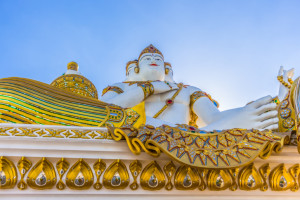
Most people know about Hinduism, but there’s an even broader philosophy that gave Hinduism its foundations. It’s called Vedanta, and it’s based on the ancient texts, the sacred scriptures of India, the Vedas. The word “Vedanta” is from two words – “veda,” meaning knowledge and “anta,” which means “the end of.” However, the goal isn’t just intellectual, but spiritual as in the “search for God.”
In Vedanta tradition, God is:
- Infinite existence
- Infinite consciousness
- Infinite bliss
Although in Indian culture, this transcendent reality is Brahman, in Vedanta, God is also very personal and can assume human form. God lives in the hearts of individuals as the divine Atman, who isn’t born and never dies. The Atman is not subject to the whims of the person in whom it lives, transcending above emotions and grief, disease and other limitations. In Vedanta, the goal of humanity is to manifest our divinity.
Who Is Chinmayananda Saraswati?
Traditionally, the teachings of Vedanta were only available to the Brahmans until around 1951, when Chinmayananda Saraswati wanted to bring them to the masses. He was the eldest son of a judge who was the nephew of the Maharaja of Cochin, and he became a celebrated spiritual leader and held advanced degrees in literature and law. Chinmayananda Saraswati instructed many of his countrymen over the years until he set out on a global tour in 1965. This tour went through 18 countries, including the United States, Europe, and Asia.
To coordinate the spiritual movement, the Chinmaya Mission was formed, but Chinmayananda Saraswati never wanted the acclaim. He just wanted to bring this worship to everyone in an attempt to create peace and harmony. He supported interfaith events and dialogue while building a resource center for Vedanta and Hinduism. The Dalai Lama visited with Chinmayananda Saraswati in 1981. He is considered instrumental in bringing awareness of the tradition to the world.
The Legacy of Chinmayananda Saraswati
The Chinmaya Mission has many ashrams where individuals can find spiritual peace in a retreat, but the legacy goes much deeper than just religious locations. Chinmayananda inaugurated rural medical facilities in areas that were traditionally underserved. He authored or co-authored over 95 works that have been translated into Indian regional languages for everyone to have access to. Today, there are more than 70 schools in his name, providing service to Indian youth.
Vedanta in Today’s Culture
2015 marked the centenary anniversary of Chinmayananda Saraswati’s birth. With this came a greater awareness of the movement. Vedanta is the highest form of yoga, the oneness of the soul with the universal consciousness that one strives to attain when practicing yoga. With Vedanta, the “entire universe dwells within your own heart.” You have to know yourself in order to find true knowledge.
Vedanta teaches that all religions lead back to the same truths about God. Although we see conflicting messages from the world’s religions, it’s more out of doctrine and dogma than any spiritual experience. The inner core beliefs of your spirituality are very similar to another’s, even though external observances may be extremely different. In today’s divisive world, studying Vedanta can bring us closer together and help us learn from each other.
Vedanta brings a message of peace and unity to the world. The key to understanding lies within your own self-awareness. All of us have the energies of love and wisdom to take on a higher manifestation of consciousness to go beyond materialistic needs. In Vedanta, you can reach your goal of manifesting your divinity to the greatest truth of your existence. Take part in the awareness of Vedanta, whether or not you celebrate Hinduism or are from India. We can learn much from our spiritual ancestors.

